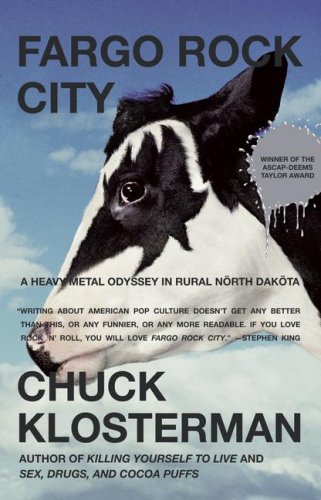I don't care what you think about Chuck Klosterman. If you don't know who he is, you should disregard whatever you heard and pick up one of his books. FARGO ROCK CITY: A HEAVY METAL ODYSSEY IN RURAL NÖRTH DAKÖTA is by any means the place to start. Klosterman is applying those faceless principle you learn in school if you're over-educated, like deconstruction, and applies it to tangible things, to elements of pop culture. One could argue that pop culture should be the last thing you worry about, that there are wars to end, world hunger to solve and cancer to cure. But I beg to differ. Pop culture is the world you live in. It's the finished product of everything. Capitalism, xenophobia, racial struggle, shift of values, etc. It's important to acknowledge and understand the monster.
That's what Chuck Klosterman does. His first book FARGO ROCK CITY is also one of his most accessible, because it's written as a heavy metal memoir. Klosterman usually tackles a wide array of issues in different essays, but this book explores only one thing. The evolution of heavy metal culture.
THREE REASONS TO READ: FARGO ROCK CITY
1) It's a book about metal, written by a fan. There's no musicology, gossip or anything that drags the discourse away from the music, the bands and their impact. FARGO ROCK CITY captures the nerdy side of heavy metal fandom in all its different angles. From blind admiration to fans rivalries.
2) It's incredibly funny. People hating on Klosterman take him extremely seriously. I heard him in interview once saying he tried to place one joke per paragraph. It's a serious analysis of heavy metal culture, but it's done with a sense of humor. And a good one, not an obscure sense of irony.
3) This is the most time anyone has tried to understand Axl Rose's Hindenburg-of-an-ego he had in the early nineties. There is a pattern to Guns N' Roses' fall from grace and this is well traced here.
THREE TOPICS ABOUT: FARGO ROCK CITY
1) Name your three favorite artists. Can you identify what they talk about in their songs? Are there moments in your life that remind you of these songs?
2) Would you agree that music is a cultural product? That different places and different people will produce different kinds of music? If yes, how so? Also, how would you explain a young man's attraction to heavy metal in rural North Dakota or a kid's attraction for American hip-hop in Poland?
3) What do you think of Klosterman's use of the academic discourse and social sciences? Is he closing the gap in between Academia and the working world or does his use of first person and humor weakens his point?

